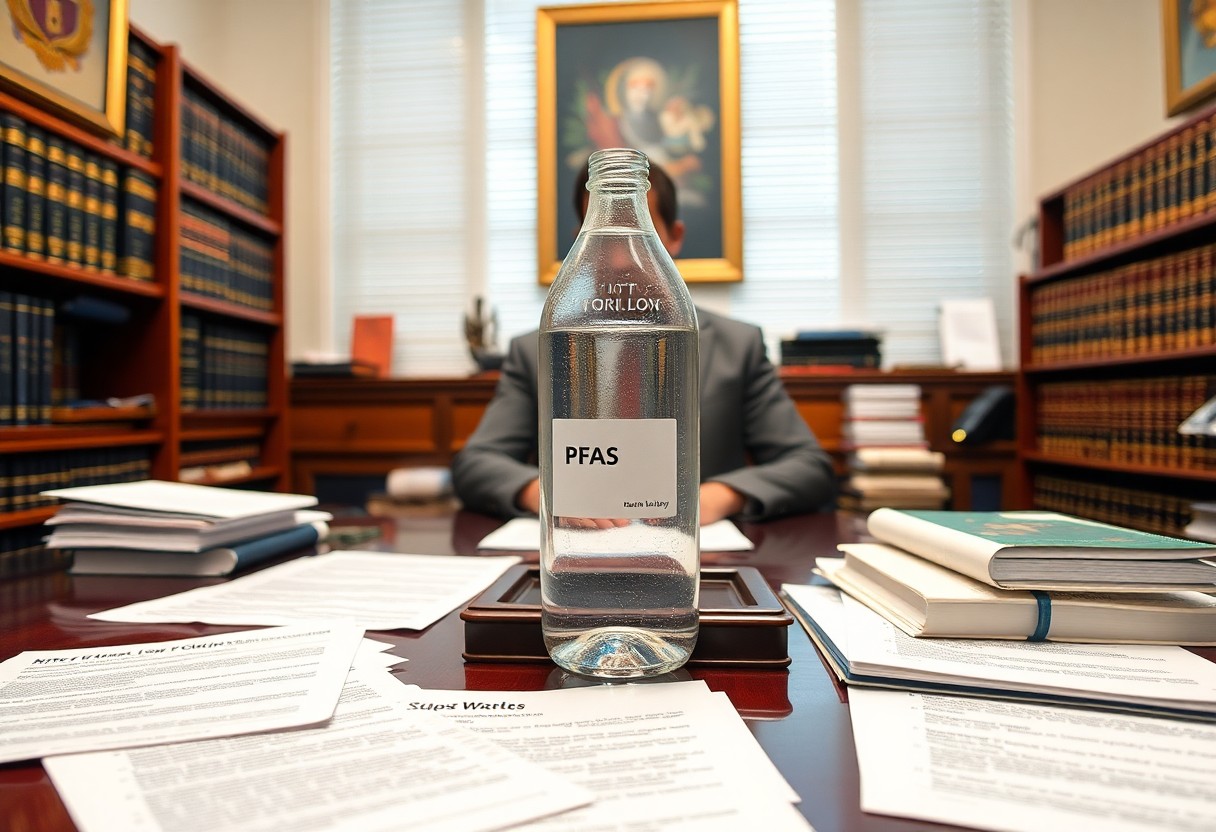Many individuals facing PFAS contamination lawsuits may feel uncertain about how to protect themselves during this ongoing process. You can take proactive steps to minimize your exposure to these harmful chemicals by being informed and making conscious choices in your daily life. In this guide, you will learn practical strategies that emphasize water filtration, dietary adjustments, and product awareness, all designed to safeguard your health while your case is pending. Your well-being is paramount, and understanding these steps will empower you to lead a healthier life amidst legal challenges.
Understanding PFAS
While PFAS, or per- and polyfluoroalkyl substances, represent a group of human-made chemicals that have been widely used since the 1940s, they are often found in everyday products such as nonstick cookware, waterproof clothing, and food packaging. Their persistent nature has earned them the nickname “forever chemicals,” as they do not easily break down in the environment or the human body.
What are PFAS?
To understand PFAS, it’s important to know that they comprise a large family of man-made chemicals designed to resist heat, oil, and water. Commonly found in products used across various industries—including textiles, firefighting foam, and food packaging—PFAS have become a significant environmental concern due to their widespread use and accumulation in ecosystems.
Health Effects of PFAS Exposure
Health effects linked to PFAS exposure can be severe, affecting various systems in your body. Studies suggest that long-term exposure may lead to increased cholesterol levels, liver damage, and disruptions in thyroid hormone levels. More alarmingly, PFAS are associated with increased risk of certain cancers, such as kidney and testicular cancer. You may also experience negative reproductive outcomes, including reduced fertility and developmental issues in infants.
Understanding the health effects of PFAS exposure is vital for you and your family’s safety. Multiple studies highlight that these chemicals can disrupt hormonal functions and may also suppress the immune system, potentially impacting vaccine efficacy. You should stay informed about your local water sources and the potential presence of PFAS in consumer products to protect yourself from their harmful effects.

Identifying Sources of PFAS
Now that you’re aware of PFAS and their potential health impacts, identifying their sources in your daily life is necessary. These chemicals are often found in common household products and may even contaminate your local water supply. By becoming aware of these sources, you can take proactive steps to reduce your exposure while your lawsuit is pending.
Household Products
An extensive range of household products might contain PFAS, from non-stick cookware to water-repellent fabrics. It’s important to check labels and consider alternatives that are free from these harmful chemicals. By opting for PFAS-free products, you can significantly lower your exposure at home.
Local Water Supply
On the topic of PFAS contamination, your local water supply may be an overlooked source of exposure. Many municipal water systems have reported detectable levels of PFAS, linking them to industrial discharges or landfill leachate. Regular testing of your water quality is advisable, and if contamination is confirmed, using home filtration systems certified to remove PFAS can protect you and your family from potential health risks associated with these substances.
PFAS contamination in your water supply can pose serious risks to your health and well-being, particularly if consumed over time. These chemicals have been linked to a range of health issues, including hormonal disruptions and increased cancer risks. Taking steps to filter your water and staying informed about the safety of your local supply is important. Regular testing and using well-reviewed filtration systems can mitigate these risks and provide you with peace of mind.
Practical Tips for Reducing Exposure
Assuming you are currently involved in a lawsuit regarding PFAS contamination, reducing exposure is important. Here are some practical tips you can implement:
- Use filtered water for drinking and cooking.
- Limit consumption of fast food and takeout due to packaging.
- Avoid products with non-stick coatings.
- Choose organic produce when possible.
- Wash clothes made from stain-resistant fabrics carefully.
After implementing these strategies, you can minimize your PFAS exposure while awaiting your lawsuit outcome.
Water Filtration Options
An effective way to reduce PFAS exposure is to install a water filtration system. Look for activated carbon filters or reverse osmosis systems, as they can significantly remove PFAS chemicals from your water supply. Regular maintenance is key to ensure efficiency, and always test your water to confirm the filtration effectiveness.
Choosing PFAS-Free Products
For your personal safety, it is vital to select PFAS-free products. This includes cookware, cleaning supplies, and household items. By checking labels and opting for safer alternatives, you can further lessen your exposure.
Reducing exposure to PFAS involves careful consideration of the products you purchase and use daily. Focus on finding safe alternatives that are labeled as PFAS-free, such as natural cleaning agents, non-toxic cookware, and personal care items without harmful chemicals. These choices not only protect your health but also promote a safer environment for you and your family.
Dietary Considerations
Keep in mind that your diet plays a significant role in reducing PFAS exposure. While waiting for your lawsuit to resolve, you can make informed choices to limit your intake of harmful chemicals. Focus on selecting fresh, organic produce and carefully sourcing your protein to mitigate potential PFAS contamination from processed foods.
Foods to Avoid
Even seemingly harmless items can harbor PFAS. Steer clear of fast food, greasy take-out, and overly processed items packaged in non-stick coatings or wrappers, as these can leach chemicals into your food. Additionally, avoid seafood sourced from contaminated water sources, as they can accumulate PFAS over time.
Safe Food Preparation
There’s an art to preparing food that minimizes exposure to PFAS. Opt for non-stick cookware made from safer alternatives, and use glass or stainless-steel containers for storage. When possible, wash fruits and vegetables thoroughly to remove any residual chemicals from packaging or pesticides, and always be cautious about using certain types of food packaging that might leach PFAS into your meals.
Foods should be prepared in a safe environment to further limit PFAS exposure. Select natural cleaning products for your kitchen to avoid introducing chemicals during meal prep. Utilize glass, ceramic, or stainless steel containers for cooking and storage, as these materials are less likely to harbor harmful substances compared to conventional non-stick varieties. Prioritize fresh ingredients and prepare them with care. By doing so, you can actively safeguard your health even amidst ongoing legal proceedings.
Environmental Awareness
Despite the ongoing legal complexities regarding PFAS, maintaining an active awareness of your environment is vital. Understanding local water sources, potential PFAS contamination sites, and the overall ecological impact can significantly reduce your exposure. Engage with community efforts to monitor environmental conditions and advocate for clean-up initiatives to protect both yourself and your community.
Understanding Local Regulations
While navigating your PFAS lawsuit, it’s important to familiarize yourself with local regulations regarding water safety and pollution control. These regulations can often dictate the measures taken to reduce PFAS in your area, helping you stay informed about any necessary precautions.
Community Resources for Support
If you seek assistance while dealing with PFAS exposure, numerous community resources can provide support, information, and guidance. Local health departments, environmental advocacy groups, and community forums can not only help you better understand the risks but also connect you with others facing similar challenges.
Regulations governing PFAS exposure can vary significantly by region, and your local health department is a valuable resource that can provide up-to-date information about testing and remediation efforts. Additionally, environmental advocacy groups often host workshops and informational panels that address community concerns and offer strategies for reducing exposure. Engaging with support networks allows you to share experiences and gather insights on navigating potential health risks effectively, empowering you in your efforts to mitigate PFAS-related dangers.
Legal Considerations During Your Lawsuit
For those involved in a PFAS-related lawsuit, it is crucial to be aware of the legal considerations that can impact your case. Staying informed about the proceedings, understanding your rights, and knowing how to effectively communicate with your legal team can make a difference in the outcome of your lawsuit. You should also remain proactive about gathering any additional evidence or documentation that could support your case while waiting for the legal process to unfold.
Documenting Exposure
The documentation of your exposure to PFAS is pivotal in building a strong case. Keep detailed records of your experiences, including any health symptoms, medical appointments, and locations where you believe exposure occurred. This solid evidence can act as a foundation for your claims and strengthen your position during negotiations or court proceedings.
Finding Legal Guidance
With the complexities involved in PFAS litigation, seeking professional legal guidance is crucial. An experienced attorney can help you navigate the legal landscape, ensuring that your rights are upheld and your case is arranged effectively for the best possible outcome.
Exposure to PFAS can have serious health implications, and having the right legal representation is fundamental to addressing these concerns. By working with a knowledgeable attorney who specializes in environmental law, you gain access to invaluable resources and experience. Your lawyer can assist you in gathering critical evidence, understanding state-specific laws, and developing a legal strategy tailored to your unique situation. With their expertise, you can feel more empowered as you pursue accountability and justice while prioritizing your well-being.
Final Words
Considering all points, it’s imperative for you to take proactive measures to minimize PFAS exposure while your lawsuit is ongoing. Focus on using filtration systems for your water, opt for PFAS-free products, and avoid fast food packaging, which may contain these substances. Educate yourself on local contaminations and maintain open communication with your legal team about new findings. By staying informed and making mindful choices, you can reduce your exposure and protect your health during this challenging time.


















